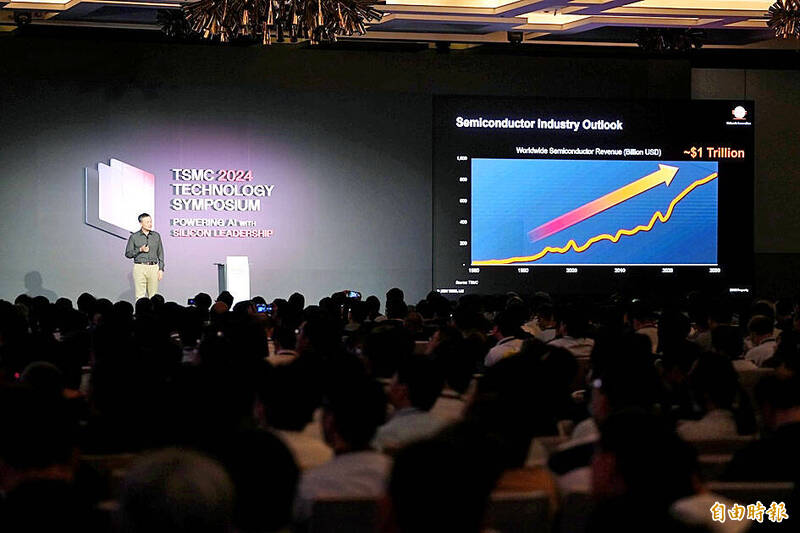《TAIPEI TIMES》 Semiconductor revenue to grow by 10%

Taiwan Semiconductor Manufacturing Co deputy cochief operating officer Cliff Hou takes the podium at the company’s annual technology symposium in Hsinchu yesterday. Photo: Grace Hung, Taipei Times
AI-DRIVEN: Strong artificial intelligence server demand, along with a mild recovery in smartphone and PC demand, would fuel the semiconductor sector’s growth, TSMC said
By Lisa Wang / Staff Reporter
Taiwan Semiconductor Manufacturing Co (TSMC, 台積電) , the world’s biggest contract chipmaker, yesterday said a surge in artificial intelligence (AI) server demand would fuel global semiconductor revenue growth this year at an annual rate of about 10 percent, excluding the memorychip sector.
“We are seeing very strong AI server demand. We are looking at a yearly growth rate of 2.5 times higher than last year,” TSMC deputy cochief operating officer Cliff Hou (侯永清) said during an annual technology symposium in Hsinchu.
The industry’s growth would also be aided by a mild recovery in smartphone and PC demand, both estimated to increase shipments by 1 to 3 percent this year from last year, shrugging off the prolonged inventory-driven slump, he said.
Automotive chip shipments are to dip as much as 11 percent annually this year, Hou said.
Internet of Things shipments are to decelerate to between 7 percent and 9 percent this year, compared with 20 percent a year in the past, he said.
For the foundry sector, where TSMC commands about 60 percent market share, the growth would be even faster at an annual pace of between 15 percent and 20 percent by revenue, Hou said.
TSMC would outgrow its peers, with a growth target of low-to-mid 20 percent annually this year, company CEO C.C. Wei (魏哲家) told investors last month.
The chipmaker supplies a majority of AI chips used in servers and data centers, including those from Nvidia Corp and AMD Inc, utilizing its advanced 4-nanometer process technology.
TSMC said the AI boom could be attributed to the evolution of advanced semiconductor technologies, given the ever-growing demand for computing power.
The steep curve of surging AI computing power demand felt like the rally of Nvidia’s stock price lately, TSMC deputy cochief operating officer Kevin Zhang (張曉強) said during the technology symposium yesterday.
Nvidia is TSMC’s most important customer in the high-performance-computing (HPC) area, Zhang said.
The computing power of Nvidia’s new Blackwell graphics processing unit (GPU) for servers, made on TSMC’s 4-nanometer technology, has soared 1,000 times compared with Nvidia’s previous GPU made on 7-nanometer technology four or five years ago, Zhang said.
Fast-growing demand for HPC and mobile devices also prompted TSMC to triple its advanced 3-nanometer technology capacity this year, Y. K. Hwang (黃遠國), a senior director in charge of TSMC’s first 3-nanometer manufacturing fab, Fab18 B, said during the symposium.
During the period of 2020 to this year, TSMC is to expand advanced capacity by an annual compound growth rate of 25 percent, including 3-nanometer, 5-nanometer and 7-nanometer chips, Hwang said.
TSMC is also stepping up new fab constructions to catch up with customers’ rising demand.
This year, the chipmaker plans to build seven factories, including three wafer manufacturing fabs, two chip packaging plants in Taiwan and two wafer manufacturing fabs overseas, Hwang said.
TSMC built three fabs last year, four fabs in 2022, and two fabs a year on average from 2017 to 2019, he said.
The company also plans to expand chip-on-wafer-on-substrate capacity at an annual compound growth rate of 60 percent through 2026, in order to cope with high demand for HPC and AI applications, Hwang said.
新聞來源:TAIPEI TIMES
















